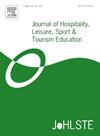Bridging the gap: Integrating hotel asset management and real estate finance in undergraduate hospitality education
IF 4.1
2区 教育学
Q1 EDUCATION & EDUCATIONAL RESEARCH
Journal of Hospitality Leisure Sport & Tourism Education
Pub Date : 2025-05-21
DOI:10.1016/j.jhlste.2025.100558
引用次数: 0
Abstract
The hospitality industry increasingly demands graduates with stronger financial acumen and asset management skills. However, many hospitality programs underemphasize hotel real estate finance and asset management, creating a competency gap between education and industry needs. This study addresses this gap by designing and evaluating a course that integrates finance, asset management, and interdisciplinary learning. A needs assessment, including curriculum reviews and stakeholder consultations, identified key competency deficiencies. Based on these findings, a new course was developed using experiential learning principles, aligning with industry standards set by the Hospitality Asset Managers Association (HAMA) and accreditation requirements of the Accreditation Commission for Programs in Hospitality Administration (ACPHA). The course content and learning outcomes were mapped to these frameworks. Industry professionals validated and enriched the course design through interviews, confirming its practical relevance. The semester-long course blends hotel asset management and real estate finance topics through experiential activities, such as case studies, projects, and simulations. Mapping analysis confirms that the course meets key HAMA domains (e.g., financial analysis, contracts) and multiple ACPHA competencies (e.g., business finance skills). Industry experts affirmed that graduates with these integrated skills would be better prepared for entry-level management roles. This is the first undergraduate hospitality course to integrate hotel asset management and real estate finance, aligned with both professional standards and academic accreditation. It offers a replicable model for enhancing hospitality education by bridging academic content with industry needs, improving student competencies and employability.
弥合差距:将酒店资产管理和房地产金融纳入本科酒店管理教育
酒店业越来越需要具有更强的财务敏锐度和资产管理技能的毕业生。然而,许多酒店管理课程对酒店房地产金融和资产管理的重视不足,造成了教育与行业需求之间的能力差距。本研究通过设计和评估一门整合了金融、资产管理和跨学科学习的课程来解决这一差距。需求评估,包括课程审查和利益相关者磋商,确定了关键的能力缺陷。基于这些发现,采用体验式学习原则开发了一门新的课程,与酒店资产管理协会(HAMA)制定的行业标准和酒店管理项目认证委员会(ACPHA)的认证要求保持一致。课程内容和学习成果映射到这些框架。业内人士通过访谈对课程设计进行了验证和丰富,证实了课程设计的实际意义。这门长达一学期的课程通过案例研究、项目和模拟等体验活动,将酒店资产管理和房地产金融主题融合在一起。映射分析证实该课程符合关键的HAMA领域(例如,财务分析,合同)和多个ACPHA能力(例如,商业财务技能)。业内专家肯定,具备这些综合技能的毕业生将为入门级管理岗位做好更好的准备。这是第一个整合酒店资产管理和房地产金融的本科酒店管理课程,符合专业标准和学术认证。它通过将学术内容与行业需求联系起来,提高学生的能力和就业能力,为加强酒店管理教育提供了一个可复制的模式。
本文章由计算机程序翻译,如有差异,请以英文原文为准。
求助全文
约1分钟内获得全文
求助全文
来源期刊
CiteScore
8.10
自引率
10.80%
发文量
41
审稿时长
42 days
期刊介绍:
The Journal of Hospitality, Leisure, Sport and Tourism Education (JoHLSTE) is the leading international, peer-reviewed educational journal for this subject grouping. Its aims are to: a) Promote, enhance and disseminate research, good practice and innovation in all aspects of higher education in Hospitality, Leisure, Sport and Tourism and Events to its prime audience including teachers, researchers, employers, and policy makers. b) Encourage greater understanding, links and collaboration across its constituent fields. JoHLSTE is designed to have maximum impact through it being available on-line, fully archived and peer-reviewed. JoHLSTE is divided into seven sections: Editorial; Academic Papers; Practice Papers, Perspectives, Comments and Rejoinders, Research Notes and Reports and Education Resource Reviews.

 求助内容:
求助内容: 应助结果提醒方式:
应助结果提醒方式:


